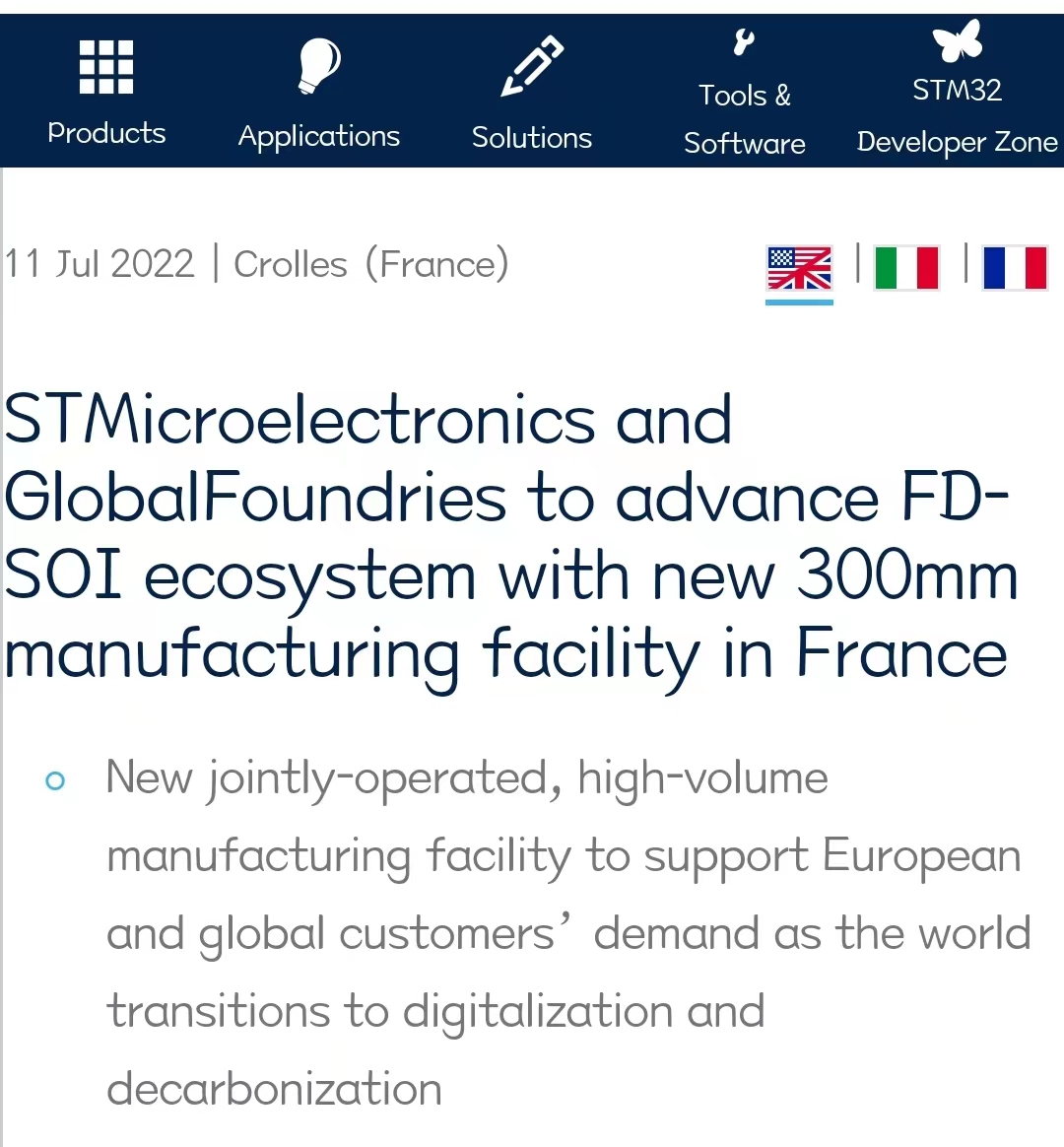On July 11, Italian chipmaker STMicroelectronics (STM) and American chipmaker Global Foundries announced that the two companies signed a memorandum to jointly build a new wafer fab in France.
According to the official website of STMicroelectronics (STM), the new factory will be built near STM’s existing factory in Crolles, France. The goal is to be in full production in 2026, with the capacity to produce up to 620,300mm (12-inch) wafers per year when fully completed. The chips will be used in cars, the Internet of Things and mobile applications, and the new factory will create about 1,000 new jobs.

The two companies did not announce the specific investment amount, but will receive significant financial support from the French government. The joint venture factory STMicroelectronics will hold 42% of the shares, and GF will hold the remaining 58%. The market had expected that the investment in the new factory could reach 4 billion euros. According to foreign media reports, French government officials said on Monday that the investment may exceed 5.7 billion.
Jean-Marc Chery, president and CEO of STMicroelectronics, said the new fab will support STM’s revenue target of more than $20 billion. ST’s fiscal 2021 revenue is $12.8 billion, according to its annual report
For nearly two years, the European Union has been boosting local chip manufacturing by offering government subsidies to reduce reliance on Asian suppliers and ease a global chip shortage that has wreaked havoc on automakers. According to industry data, more than 80% of the world’s chip production is currently in Asia.
STM and GF’s partnership to build a factory in France is the latest European move to develop chip manufacturing to reduce supply chains in Asia and the U.S. for a key component used in electric vehicles and smartphones, and will also contribute to the goals of the European Chip Law huge contribution.

In February this year, the European Commission launched a “European Chip Act” with a total scale of 43 billion euros. According to the bill, the EU will invest more than 43 billion euros in public and private funds to support chip production, pilot projects and start-ups, of which 30 billion euros will be used to build large-scale chip factories and attract overseas companies to invest in Europe. The EU plans to increase its share of global chip production from the current 10% to 20% by 2030.
The “EU Chip Law” mainly proposes three aspects: first, propose the “European Chip Initiative”, that is, to build a “chip joint business group” by pooling resources from the EU, member states and relevant third countries and private institutions of the existing alliance. , to provide 11 billion euros to strengthen existing research, development and innovation; second, to build a new cooperation framework, that is, to ensure supply security by attracting investment and increasing productivity, to improve the supply capacity of advanced process chips, by providing funds for start-ups Provide financing facilities for enterprises; third, improve the coordination mechanism between member states and the Commission, monitor the semiconductor value chain by collecting key enterprise intelligence, and establish a crisis assessment mechanism to achieve timely forecasting of semiconductor supply, demand estimates and shortages, so that a quick response can be made.
Shortly after the launch of the EU Chip Law, in March this year, Intel, a leading US chip company, announced that it would invest 80 billion euros in Europe in the next 10 years, and the first phase of 33 billion euros will be deployed in Germany, France, Ireland, Italy, Poland and Spain. countries to expand production capacity and improve R&D capabilities. Of this, 17 billion euros were invested in Germany, for which Germany received 6.8 billion euros in subsidies. It is estimated that the construction of a wafer manufacturing base in Germany called “Silicon Junction” will break ground in the first half of 2023 and is expected to be completed in 2027.
Post time: Jul-12-2022